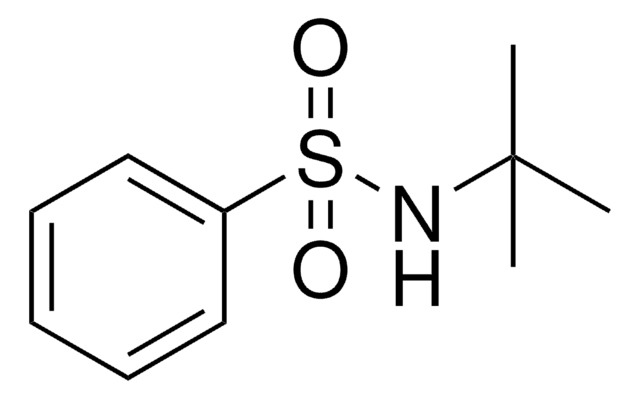All Photos(1)
About This Item
Linear Formula:
C6H5SO2NH(CH2)3CH3
CAS Number:
Molecular Weight:
213.30
EC Number:
MDL number:
UNSPSC Code:
12352100
PubChem Substance ID:
NACRES:
NA.22
Recommended Products
vapor pressure
0.35 mmHg ( 150 °C)
Assay
99%
form
liquid
refractive index
n20/D 1.525 (lit.)
bp
314 °C (lit.)
density
1.15 g/mL at 25 °C (lit.)
SMILES string
CCCCNS(=O)(=O)c1ccccc1
InChI
1S/C10H15NO2S/c1-2-3-9-11-14(12,13)10-7-5-4-6-8-10/h4-8,11H,2-3,9H2,1H3
InChI key
IPRJXAGUEGOFGG-UHFFFAOYSA-N
Related Categories
Signal Word
Warning
Hazard Statements
Precautionary Statements
Hazard Classifications
Aquatic Chronic 3 - STOT RE 2
Storage Class Code
10 - Combustible liquids
WGK
WGK 1
Flash Point(F)
235.4 °F - closed cup
Flash Point(C)
113 °C - closed cup
Personal Protective Equipment
dust mask type N95 (US), Eyeshields, Gloves
Certificates of Analysis (COA)
Search for Certificates of Analysis (COA) by entering the products Lot/Batch Number. Lot and Batch Numbers can be found on a product’s label following the words ‘Lot’ or ‘Batch’.
Already Own This Product?
Find documentation for the products that you have recently purchased in the Document Library.
M J Strong et al.
Acta neuropathologica, 81(3), 235-241 (1991-01-01)
N-Butyl benzenesulfonamide (NBBS), a plasticizer used commercially in the polymerization of polyamide compounds, is neurotoxic. Young adult New Zealand white rabbits, inoculated repeatedly with NBBS by the intracisternal or intraperitoneal routes, developed a dose-dependent motor dysfunction characterized by limb splaying
N-butylbenzenesulphonamide, a novel neurotoxic plasticising agent.
M J Strong et al.
Lancet (London, England), 336(8715), 640-640 (1990-09-08)
Preliminary observations on the in vitro toxicity of N-butylbenzenesulfonamide: a newly discovered neurotoxin.
V R Nerurkar et al.
Annals of the New York Academy of Sciences, 679, 280-287 (1993-05-28)
W Y Lee et al.
Veterinary and human toxicology, 37(6), 537-542 (1995-12-01)
N-butyl benzenesulfonamide (NBBS), one of the sulfonamide plasticizers, induced characteristic effects to Wistar rats after acute repeated exposures (300 mg/kg body weight, ip every 6 h). The signs were pica, staggering gait with hindlimb-paresis and splaying, teeth-grinding, self paw-biting and
Sonja Schleich et al.
Planta medica, 72(9), 807-813 (2006-06-20)
Extracts from Pygeum africanum, Serenoa repens and Cucurbita pepo are used in the treatment of benign prostatic hyperplasia (BPH) and prostate cancer (PCa). The activity of the androgen receptor (AR) is known to control growth of the prostate. Here, we
Our team of scientists has experience in all areas of research including Life Science, Material Science, Chemical Synthesis, Chromatography, Analytical and many others.
Contact Technical Service









